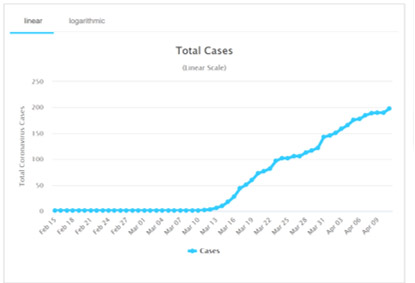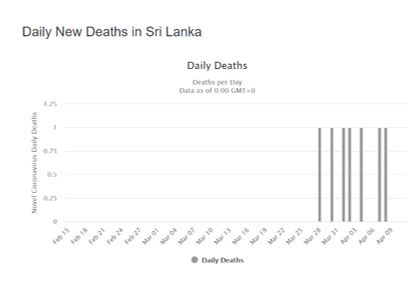This is an eye opener. Consequences of this will be short term and long term. In the short run how to bring the country back to normal by opening the free movement. Still there is a risk of opening this country as of the random cases reported elsewhere. I came to know that there is a strong dialogue in the country about bring this back to normal as one party says it should open as soon as possible and the other argue the risk on opening without considering the second peak. I think best decision will be taken by the government considering all the risk factors.
In the long run we must take care of the economy of the country. Sri Lanka is a country heavily depended on tourism, but we need to understand the instability of such industries and need of exploring other possible incomes to the country. If not at least diversification of our incomes while protecting our national heritage.
Sri Lanka took a timely decision to control movements of people by imposing curfew. All the schools, universities, government offices and private sector organizations were closed except emergency services, such as food supply chain and medical services. With the guidance of the government and the Ministry of Health, security forces, police and health officers took the total control.
4. Lessons Learned
The very first lesson is to live on very limited things - most of the stuff we use every day can be simplified with less harm to the environment and some are unnecessary.
Good health habit is one of the important lesson of this pandemic. Frequent wash of hands and keeping social distance were difficult exercises to practice in our nation but people are waiting in long queues keeping the distance and they cleaned their hands now frequently and wear masks.
Importance of moral fitness to face this nature of situations are also very important. Some of our institutes have started to think about producing some new equipment with our own capacity as a remedy to shortage of medical equipment etc.
Potential of online teaching and meetings for the university - It was a very good opportunity to test the feasibility. I started a module to conduct through Zoom and there were 58 students in my class out of 64. Also, the university conducted member of online meetings. In the future connectivity can be maintained through online for many activities that can reduce the mobility that will give us great opportunities to save our time and economies as well.
Use of online payments instead of money- Although the practice was in very common in China, in Sri Lanka most of the people use money for transactions. Now the trend has change to make most of the payments through cards. Electronic payment system can be further improved.
Need of a national database of people of this country to trace their mobility, not only for tracking the pandemic situation but also for public identifying the risk areas.
This opportunity have us to think about our food security and a need of a national policy on economics. This crisis will compel the government to reduce imports and thus produce our own consumptions within the country as much as possible as the imports are totally suspended now.
The best lesson learned is that “Everything is Surrendered to Nature” and the need of maintaining our lives without going against the nature. The ultimate lesson I learned.
5. Concerns from the Government and People
Most of the people are positive about the decisions taken by the government and the health services. The government has predicted negative growth of the country at least for the next few months. In general Sri Lankan policy is based on eastern philosophy, at least mostly not western. Lives of our people are important than anything and the economy come second.
The Government has appointed a task force for revamping education sector. With the recommendations of the task force I think every possible measure will be taken to address the burden issues of the education due to this pandemic.
6. Advices from Experts to the Government
The government plan is based on expert advice and not oriented to political gains. That is one of the good sides of this incident. The security forces are dedicating their full energy for the quarantine process while the medical teams are putting their full strengths to manage the health services. From the beginning the government plan was to control spreading the virous and limit the number of patients as that will ease managing the health services. All the essential items are provided to the people through mandatory services. Decisions are taken daily basis considering the statistics and a day will come very soon that this controls are relaxed.
7. Knowledge and Capacity Gaps
Sufficient knowledge base is available within the country to mange the issue and that has been proven by the decisions taken so far. Regarding the capacity gaps, the important issue is tests for the virus. The standard test is PCR but there were not enough machines within the health sector, but that issue was solved after calling universities and research institute into the support. The other issue is on rapid test kits as there is a great demand supplies are limited. According to my knowledge respirators are sufficient if the number of infections could be managed with the present level. Number of institutes and universities in the country are taking measures to produce respirators locally. That is a god sign of motivation.
8. Ideas, Suggestions and Comments
Establishment of natural disaster mitigation centers is one of the ways out. If we had such centers, we cloud share our knowledge to handle this issue better than now by sharing our technology and know-how. Also sharing our facilities to combat some of the issues. We would like to propose ANSO to think about global mechanism to combat this nature of issue by stablishing a suitable framework. Probably one of such may be capacity building to combat natural disasters and mitigate the impact by establishing regional centers, covering biological disaster of this nature.
9. Other Issues to be Addressed
We appreciate the support extended China to the other nations at this difficult time sharing their experiences. Otherwise this could have been more severe than what we are experiencing today.
China as one of the leading nations in the world can take the leadership to make the world a safe place for living, by taking this experience better than now.
Acknowledgement: This report is submitted by Professor Tilak P D Gamage, University of Ruhuna, Sri Lanka.


